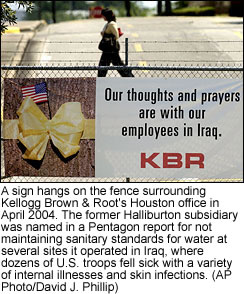Dozens of U.S. troops in Iraq fell sick at bases using “unmonitored and potentially unsafe” water supplied by the military and a contractor once owned by Vice President Dick Cheney’s former company, the Pentagon’s internal watchdog says.

A report obtained by The Associated Press said soldiers experienced skin abscesses, cellulitis, skin infections, diarrhea and other illnesses after using discolored, smelly water for personal hygiene and laundry at five U.S. military sites in Iraq.
The Defense Department’s inspector general’s report, which could be released as early as Monday, found water quality problems between March 2004 and February 2006 at three sites run by contractor KBR Inc., and between January 2004 and December 2006 at two military-operated locations.
It was impossible to link the dirty water definitively to all the illnesses, according to the report. But it said KBR’s water quality “was not maintained in accordance with field water sanitary standards” and the military-run sites “were not performing all required quality control tests.”
The report said KBR took corrective steps and was providing adequate water quality by November 2006. But military units at the two sites they controlled were still failing to perform required quality control tests and maintain appropriate records by that time.
“Therefore, water suppliers exposed U.S. forces to unmonitored and potentially unsafe water,” at the military sites by late 2006, the report said.
The problems did not extend to troops’ drinking water, but rather to water used for washing, bathing, shaving and cleaning. Water used for hygiene and laundry must meet minimum safety standards under military regulations because of the potential for harmful exposure through the eyes, nose, mouth, cuts and wounds.
The KBR sites were Camp Ar Ramadi, Camp Q-West and Camp Victory. The military sites were Logistics Support Area Anaconda and Camp Ali.
The inspector general’s study confirmed AP reports on the contaminated water in early 2006 and provided additional details on the scope of the problem at the Iraq bases. In January that year, interviews and internal company documents disclosed the problems at Ar Ramadi and showed that KBR employees could not get the company to inform base residents.
Halliburton Co., then KBR’s parent company, disputed the allegations even though they were made by its own employees and documented in company e-mails. In March 2006, the AP obtained an internal Halliburton report that, in one instance, the company missed contamination that could have caused “mass sickness or death” at Ar Ramadi.
The report said the event at Ar Ramadi could have been prevented if KBR’s reverse osmosis units on the site had been assembled, instead of relying on the military’s water production facilities.
Halliburton is the oil services conglomerate that Cheney once led. Congressional Democrats long have complained that KBR has benefited from its former ties to Cheney.
KBR, responding to the inspector general’s report, said its water treatment “has met or exceeded all applicable military and contract standards.” The company took exception to many of the inspector general’s assertions. “KBR’s commitment to the safety of all of its employees remains unwavering,” the company said in a statement to the AP.
KBR provided water treatment to U.S. troops under a large-scale defense contract that also included housing and food to soldiers in Iraq, Afghanistan, Kuwait, Djbouti and Georgia.
The military has “taken the appropriate measures to correct the problem and ensure we provide the appropriate oversight of the system,” said Navy Capt. James Graybeal of the U.S. Central Command, which oversees U.S. troops in the Middle East.
North Dakota Sen. Byron Dorgan, who has led Democratic inquiries into contracting abuses in Iraq, said the inspector general has backed up what those earlier hearings uncovered. “KBR was not doing its job” and U.S. forces had water that did not meet Army standards, Dorgan said.
“I think it’s outrageous that KBR tried to deny that there was a problem, especially when it turned out that there were dozens of U.S. troops reporting water-related illnesses,” he said.
The inspector general investigated the 2006 reports at Dorgan’s request.
The inspector general’s report said some troops noticed problems with the water. Between October 2004 and May 2005, troops at Camp Ar Ramadi said bathwater was discolored and had an unusual odor. The report said KBR failed to treat the nonpotable water and monitor water quality during the same period.
At Camp Q-West, KBR inappropriately delivered chlorinated wastewater for showers and latrines without informing military preventive medicine officials, the report said. “KBR did not monitor or record the quality of water at point-of-use containers before April 2006, even though the … contract required the company to do so,” the report added.
Medical records for troops at Camp Q-West indicated 38 cases of illnesses commonly attributed to problem water. These include skin abscesses, cellulitis, skin infections and diarrhea. Doctors diagnosed 24 of the cases in January and February 2006, the same period when medical officials warned of a rise in bacterial infections at the base.
In addition, military medical records – tied to no particular base in Iraq – showed 26 cases of food and waterborne diseases, including hepatitis, giardiasis and typhoid fever.
© 2008 Associated Press
Published on Monday, March 10, 2008Source: Associated Press